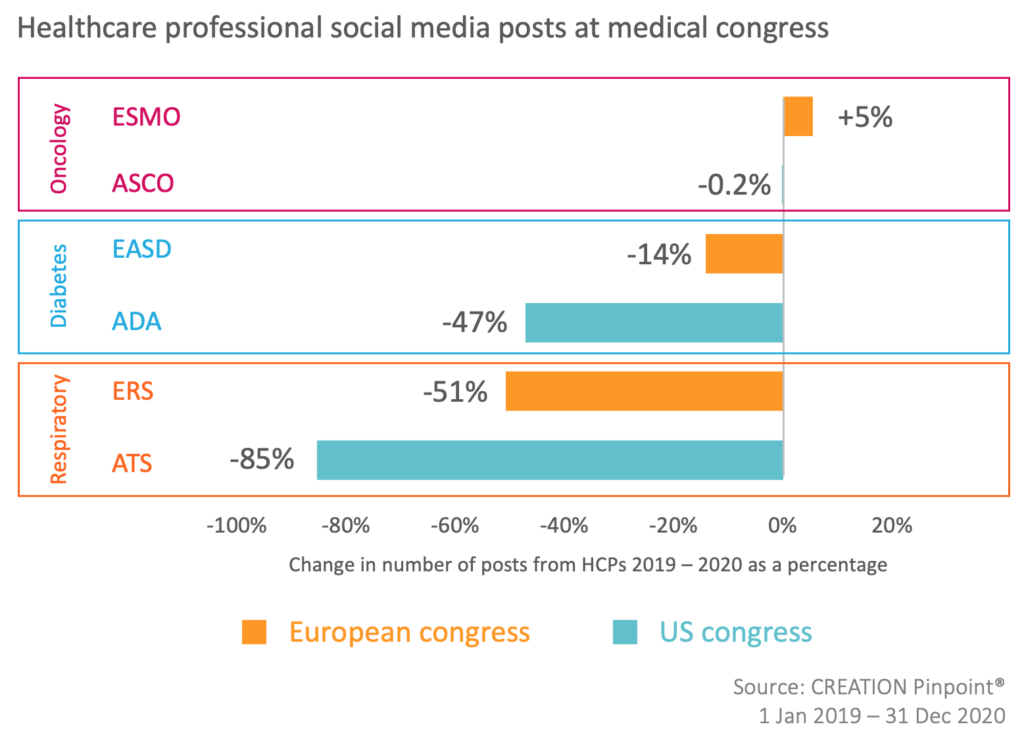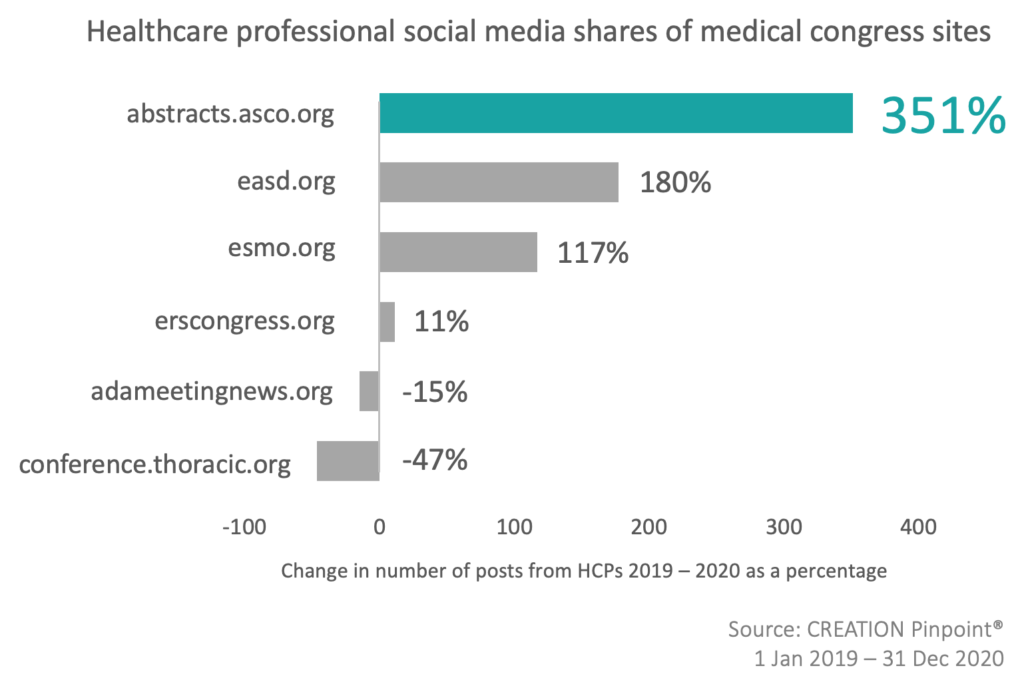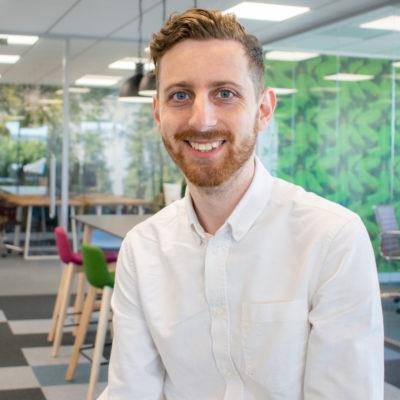From heaving auditoriums and packed exhibition halls to bedrooms, studies and cafes: medical congresses changed dramatically in 2020. In 2019 gathering at medical and scientific meetings with hundreds, thousands or even tens of thousands of their medical peers may have been a highlight in many HCPs’ annual calendars.
Since the outbreak of COVID-19 we have observed a large overall increase in the total number of posts online from HCPs. However, there was often less online engagement from HCPs at congress during 2020.
We set out to learn what was and wasn’t successful for HCP social media engagement during the virtual congress of 2020 compared to the 2019 in person meetings.

Differences from across the pond
In 2020, all three of the European conferences performed better than their American therapy area counterparts, relative to the 2019 volume. HCPs actually posted more at ESMO 2020 than ESMO 2019 and while there was less engagement at other congresses the decline was less noticeable at the European meetings.
Virtual oncology congresses fair well in COVID-focused year
2020 had little impact on the level of activity at the oncology congresses. The volume of conversation declined somewhat at the diabetes meetings and sharply at the respiratory disease meetings. COVID-19 was a topic of discussion at all six of the conferences but there was no correlation between how much it was discussed and the overall increase or decrease in conversation from 2019. COVID-19 was mentioned in 18% and 9% of posts at ERS and ATS; unsurprisingly the respiratory disease meetings focused most on the pandemic. At both oncology meetings 1 in 14 HCP posts discussed the virus while at EASD and ADA as a topic it featured in just 4% and 2% of posts. Relatively therefore the pandemic had the smallest impact on the online conversation of HCPs at diabetes congresses.
HCP behaviour change: screenshots replace photos
Many companies running trials for products would wait to share the key results at a medical conference when the right audience would be present to hear it and disseminate those results to their peers. As a key reason why HCPs attend a medical congress we would often see HCPs post photos to social media of a speaker standing on stage next to their slides. Sometimes these photos captured the data on the slide clearly and sharply but other times these were slightly cropped or blurry photos taken on mobile devices with varying qualities of camera.
During 2020 with no live in-person presentations it left attendees who wanted to share what they were seeing with two main choices; take photos of the screen they are participating on or use a screenshot functionality. Many chose the latter meaning we saw more and often higher quality images being shared summarising trial results.
Great summary slide of key #immunotherapy trials in #TNBC by @ErikaHamilton9 #ASCO20 #BCSM pic.twitter.com/BrXJY8Uvtq
— Roberto Leon-Ferre (@rleonferre) May 30, 2020
HCP behaviour change: congress websites
As most participants joined the meetings from computers there was an opportunity for more digital connectivity, beyond social media and most of the congress organisers leveraged this well. Healthcare professionals shared links to the congress websites on social media more often during the 2020 meetings.

ESMO, EASD and ASCO were the particular winners in this behaviour change – HCP shares to their materials more than doubled for all three.
In the case of ASCO, HCPs sharing links from asco.com from 2019 to 2020 actually quadrupled. This included 454 shares of ASCO’s statement about COVID-19, over 100 shares of the ASCO 2020 program and a fundraising drive for Conquer Cancer (the ASCO Foundation).
HCPs discuss virtual format
Initially there was general approval of the virtual meeting formats, Riyaz Shah a Consultant Medical Oncologist in the UK said he was ‘loving it’ and others praised meeting organisers for the transition.
I’m loving this virtual #ESMO20 format. A brain challenging rejuvenation away from talk of a second wave.
— Dr Riyaz Shah (@DrRiyazShah) September 20, 2020
My Scottish gran used to insulate me from insults by saying “everyone’s a critic”
What she meant is that anyone can find fault if they look closely enough, as none of us are perfect
So while there might have been some tech glitches let’s applaud @asco for the #asco20 meeting! pic.twitter.com/6RS0B5lHG9
— Mark Lewis (@marklewismd) May 31, 2020
While many of the elements that HCPs know and love can be experienced whatever the format, there was of course the loss of connection and gathering with peers that was irreplaceable in 2020. It was evident some were desperate to go back to the experiences of the big lecture, the gatherings around coffee, vendor expos and evening meals out together.
I respect how absolutely necessary the virtual format is during the #COVID19 pandemic (and you're knocking it out of the park w #ASCO20!) but the very moment we go back to in-person meetings, I will be the first one there!! Miss you all! pic.twitter.com/u6nd3YJl24
— Ishwaria Subbiah, MD MS (@IshwariaMD) August 9, 2020
It seems this year at the very least a hybrid model will be required for some medical congresses, if not full remaining virtual. But even after the pandemic has reached a manageable level globally there was so much appreciation for the virtual transition of meetings that there was optimism about ongoing hybrid model formats in future years.
Lucilla Piccari, a pulmonologist in Spain, posted about her support for the physical plus virtual model citing fairness to those less able to attend in-person and the environmental impact of thousands using air travel.
Evaluating the wonderful past #ERSCongress on the @EuroRespSoc, my answer to "Which congress format would you prefer in the future?" was "a combination of face-to-face and virtual" and my reason for choosing this was:
— Lucilla Piccari @LucillaPiccari@med-mastodon (@LucillaPiccari) September 24, 2020
Learnings for 2021
In examining the unprompted opinions and needs of HCPs through their online conversation, here are five top tips for anyone organising, attending or exhibiting at events post-2020.
1. Make it interactive
The general consensus was that HCPs preferred sessions to be more interactive while virtual. One HCP missed the laser pointer to highlight the important parts of the slide – could you help speakers simply use their mouse to show where they are on a slide?
In the last year most people will at some point have struggled through a meeting that was ‘TV style’ – simply watching a screen. There was praise for the openness to audience questions during sessions and dedicated Q&A sessions, which you could consider.
2. Promote the convenience
The flexibility of being able to be at home with family or children, to take part in some sessions around a work schedule or even from another convenient location, such as a cafe, was a big plus for some. You could celebrate this by making this another interactive feature: perhaps find out where people are dialling in from and who they are with.
3. Keep to time
While some may have wanted to see a little more interaction at ASCO 2020, what could be appreciated about the well planned schedule was how well the timing ran. If HCPs are going to be dipping and out of sessions, they want to know things will start and end when they are programmed to.
4. Do technical rehearsals
Yes, plural, rehearsals. Dial into practice meetings from various operating systems, desktop, tablet and mobile, make sure any interactive elements work as you expect them to, be sure all slides are going to share correctly. While teething problems experienced last year can be prescribed to a first attempt at full-virtual on short notice, this year we know what’s coming – let’s be ready and sure no one will be excluded by the technology.
5. Make the data fly
It is clear some elements of the in-person session cannot be replicated online. Breakthrough data projected up on the big screen with hundreds, if not thousands like-minded colleagues excitedly taking it in around you is probably one of those. However as much as HCPs miss being in sessions, there are lots of creative ideas out there to have data singing whether that be around the design and presentation or the meeting structure and interactivity. Any practice-changing data shared in 2021 is still practice-changing – you just need to make sure your communication around it gives it the platform it needs.
CREATION.co has been keeping track of the latest digital behaviours of HCPs at medical congresses for over a decade and supports clients to plan, track and review congress objectives. If you would like to find out how we can support you then get in touch, we’d love to help.
Methodology
CREATION Pinpoint was used to isolate the voice of healthcare professionals in online social media conversations during top medical/scientific congresses during 2019 and 2020. In order to analyse how much of an impact congress had on the online conversations of HCPs, six medical congresses were examined. The congresses studied, ASCO, ESMO, ADA, EASD, ATS and ERS, were based in the US and European in three therapy areas; oncology, diabetes, respiratory disease.
 By Jamie Doggett
By Jamie Doggett 


